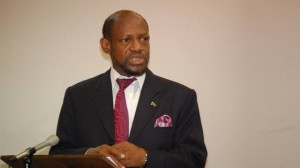 BASSETERRE, ST. KITTS – The Leader of the Opposition in St. Kitts and Nevis, the Right Hon. Dr. Denzil L. Douglas said while the authority and impartiality of a Speaker of the National Assembly must be upheld at all times, it was important for the Parliamentary Opposition to bring the Motion of No Confidence because of the way the Hon. Michael Perkins conducted the affairs of the lawmaking body while he also served Deputy Speaker.
BASSETERRE, ST. KITTS – The Leader of the Opposition in St. Kitts and Nevis, the Right Hon. Dr. Denzil L. Douglas said while the authority and impartiality of a Speaker of the National Assembly must be upheld at all times, it was important for the Parliamentary Opposition to bring the Motion of No Confidence because of the way the Hon. Michael Perkins conducted the affairs of the lawmaking body while he also served Deputy Speaker.
“We believe that the time had come for us to bring to the Parliament our view for the Parliament to agree that the Speaker had strayed from the fundamental principles of exercising authority and demonstrating impartiality as he carries out his responsibilities in Parliament,” said Dr. Douglas during Tuesday’s edition of “Ask the Leader” on Kyss 102.5 FM.
Dr. Douglas said that the Parliamentary Opposition is aware that if there is a ruling by the Speaker, the way to deal with it, is to bring it to his attention either within the Parliament, if it is allowed right there and then when the ruling is being made or one can use the Rules and the Standing Orders of the House to bring a resolution to question the decision that would have been taken by the Speaker on matters which are fundamental in the good conduct of the affairs in the House.
He said no one questions the authority of the Speaker, but there is good reason to question his impartiality.
“We set out by way of a Motion to be brought to the National Assembly for debate. The fact that we in the Parliamentary Opposition believed that some of those decisions taken by Speaker Perkins in the past and especially in our recent debate on the Budget in December of 2016, we believe that impartiality was not demonstrated in the conduct of the affairs and maintaining the authority in the Parliament,” Dr. Douglas told listeners.
Dr. Douglas, who served as Prime Minister for nearly 20 years, emphasised that the Parliamentary Opposition is strongly of the view that the matters determined in the House, irrespective of who brings them to the lawmaking body, are matters that are fundamental to the smooth functioning of a democratic state.
“By way of resolution, we clearly indicated that we are not challenging the authority of the Speaker, but we are challenging what appears to be the demonstration of partiality or lack of impartiality, which is what we believe is meant when the Constitution that basically says that the principle of impartiality should be maintained by the Speaker,” he submitted.
Dr. Douglas admitted that the Parliamentary Opposition was very surprised that having submitted the resolution or the Motion since the13th December and recognising the importance of this matter, “we asked that the very first sitting of the National Assembly should hear this Motion so that as we move into the new year, we would not become entrapped or side tracked by rulings which we consider to lack impartiality and thus having the Speaker reflect and be more determined to demonstrate impartiality in our Parliament, the motion was disallowed,”
He noted that in disallowing the motion, Speaker Perkins referenced a rule in the Standing Orders which was not applicable to the matter as the amendment by insertion of the word ‘not’ when the Motion was resubmitted on December 30th.
“The amendment was made long before the sitting of the Parliament. The rule that the Speaker referred to has to do with an amendment to a motion already on the floor actively being debated. It was a flimsy excuse to disallow the motion,” said Dr. Douglas, who added:
“What was noticeable and which really created a stir, was the Speaker’s response to the various matters which were identified as the reasons for bringing the motion when although not allowing debate on the motion proceeded to respond to every single one in defence of his position. How can he do that? How can he allow himself to begin to debate and respond to the matters raised against him? Why would he want to be judge, jury and executioner?”
Dr. Douglas was of the view that the Deputy Speaker should have taken the chair to preside over the issue.
“I do not believe it is right for the Speaker to begin to debate the motion attempting to defend himself paragraph after paragraph. That is not right, it is not just and it is not fair, displaying as judge, jury and executioner in the process of the proceedings,” said Dr. Douglas.
